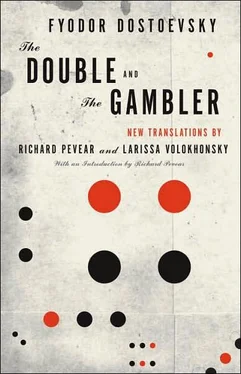Fyodor Dostoevsky - The Gambler
Здесь есть возможность читать онлайн «Fyodor Dostoevsky - The Gambler» весь текст электронной книги совершенно бесплатно (целиком полную версию без сокращений). В некоторых случаях можно слушать аудио, скачать через торрент в формате fb2 и присутствует краткое содержание. Жанр: Классическая проза, на английском языке. Описание произведения, (предисловие) а так же отзывы посетителей доступны на портале библиотеки ЛибКат.
- Название:The Gambler
- Автор:
- Жанр:
- Год:неизвестен
- ISBN:нет данных
- Рейтинг книги:4 / 5. Голосов: 1
-
Избранное:Добавить в избранное
- Отзывы:
-
Ваша оценка:
- 80
- 1
- 2
- 3
- 4
- 5
The Gambler: краткое содержание, описание и аннотация
Предлагаем к чтению аннотацию, описание, краткое содержание или предисловие (зависит от того, что написал сам автор книги «The Gambler»). Если вы не нашли необходимую информацию о книге — напишите в комментариях, мы постараемся отыскать её.
The Gambler — читать онлайн бесплатно полную книгу (весь текст) целиком
Ниже представлен текст книги, разбитый по страницам. Система сохранения места последней прочитанной страницы, позволяет с удобством читать онлайн бесплатно книгу «The Gambler», без необходимости каждый раз заново искать на чём Вы остановились. Поставьте закладку, и сможете в любой момент перейти на страницу, на которой закончили чтение.
Интервал:
Закладка:
“For God’s sake, for God’s sake, Alexei Ivanovich, drop this senseless intention!” the general muttered, suddenly changing his wrathful tone to a pleading one and even seizing me by the hands. “Well, imagine what will come of it? Another unpleasantness! You must agree, I have to behave myself in a special manner here, especially now!…especially now!…Oh, you don’t know, you don’t know all my circumstances!…When we leave here, I’m prepared to take you back. It’s only just so, well, in short—you do understand the reasons!” he cried desperately. “Alexei Ivanovich, Alexei Ivanovich!…”
Retreating to the door, I again earnestly begged him not to worry, promised that everything would turn out well and decently, and hastened to leave.
Russians abroad are sometimes much too cowardly and are terribly afraid of what will be said of them, and how they’ll be looked at, and whether this or that will be proper; in short, they behave as if they’re in corsets, especially those who make claims to significance. What they like most is some preconceived, pre-established form, which they follow slavishly—in hotels, on promenades, at assemblies, while traveling…But on top of that the general had let slip that he had some special circumstances, that he somehow had to “behave specially.” That was why he was suddenly so pusillanimous and cowardly and changed his tone with me. I took that into consideration and made note of it. And, of course, tomorrow he might foolishly turn to some authorities, so that I indeed had to be careful.
However, I had no interest at all in angering the general himself; but I did want to anger Polina a little now. Polina had dealt so cruelly with me, and had pushed me onto such a stupid path, that I wanted very much to drive her to the point of asking me to stop. My prankishness might finally compromise her as well. Besides that, some other sensations and desires were taking shape in me. If, for instance, I voluntarily vanish into nothing before her, that does not at all mean that I’m a wet chicken before people, and it is certainly not for the baron to “beat me with a stick.” I wanted to make fun of them all and come out as a fine fellow. Let them see. Never fear! she’ll be afraid of a scandal and call for me again. And if she doesn’t, she’ll still see that I’m not a wet chicken…
(Astonishing news: I’ve just heard from our nanny, whom I met on the stairs, that Marya Filippovna set off today for Karlsbad, all by herself, on the evening train, to visit her cousin. What kind of news is that? The nanny says she had been intending to for a long time; but how is it no one knew? However, maybe only I didn’t know. The nanny let slip that Marya Filippovna had had a big talk with the general two days ago. I understand, sir. It’s probably—Mlle Blanche. Yes, something decisive is coming for us.)
CHAPTER VII
THE NEXT MORNING I sent for the desk clerk and told him that my account should be kept separately. My room was not so expensive that I should get very frightened and leave the hotel. I had sixteen friedrichs d’or, and there…there, maybe, lay riches! Strange thing, I haven’t won yet, but I act, feel, and think like a rich man, and I can’t imagine myself otherwise.
I planned, despite the early hour, to go at once and see Mr. Astley at the Hôtel d’Angleterre, very near us, when suddenly des Grieux came into my room. This had never happened before, and, on top of that, the gentleman and I had lately been in the most alienated and strained relations. He plainly did not conceal his contempt for me, even made an effort not to conceal it; while I—I had my own reasons not to favor him. In short, I hated him. His visit surprised me very much. I realized at once that something very special was brewing.
He came in very amiably and paid my room a compliment. Seeing that I had my hat in my hand, he inquired if I was really going for a walk so early. When he heard that I was going to see Mr. Astley on business, he reflected, understood, and his face acquired an extremely preoccupied look.
Des Grieux was like all Frenchmen, that is, cheerful and amiable when it was necessary and profitable, and insufferably dull when the necessity to be cheerful and amiable ceased. A Frenchman is rarely amiable by nature; he is always amiable as if on command, out of calculation. If, for instance, he sees the necessity of being fantastic, original, out of the ordinary, then his fantasy, being most stupid and unnatural, assembles itself out of a priori accepted and long-trivialized forms. The natural Frenchman consists of a most philistine, petty, ordinary positiveness—in short, the dullest being in the world. In my opinion, only novices, and Russian young ladies in particular, are attracted to Frenchmen. Any decent being will at once notice and refuse to put up with this conventionalism of the pre-established forms of salon amiability, casualness, and gaiety.
“I’ve come to see you on business,” he began extremely independently, though, by the way, politely, “and I will not conceal that I’ve come as an ambassador or, better to say, a mediator from the general. Knowing Russian very poorly, I understood almost nothing yesterday; but the general explained it to me in detail, and I confess…”
“Listen, M. des Grieux,” I interrupted him, “here you’ve undertaken to be a mediator in this business as well. I am, of course, ‘ un outchitel ,’ and have never claimed the honor of being a close friend of this house or on any especially intimate relations, and therefore I do not know all the circumstances; but explain to me: can it be that you now fully belong to the members of this family? Because, finally, you take such interest in absolutely everything, you unfailingly become a mediator in it all straight away…”
He didn’t like my question. It was only too transparent for him, and he didn’t want to let anything slip.
“I am connected with the general partly by business, partly by certain special circumstances,” he said dryly. “The general has sent me to ask you to drop your intentions of yesterday. Everything you thought up was, of course, very clever; but he has precisely asked me to represent to you that it will be a total failure; moreover, the baron will not receive you, and, finally, in any case, he has every means of ridding himself of any further unpleasantness on your part. You’ll agree yourself. Why go on with it, tell me? The general has promised you that he will certainly take you back into his household at the first convenience, and until that time will credit you for your salary, vos appointements . [14] Your emoluments.
Rather profitable, is it not?”
I objected to him quite calmly that he was somewhat mistaken; that maybe I would not be chased out of the baron’s, but, on the contrary, be listened to; and I asked him to admit that he had probably come in order to worm out of me precisely how I was going to set about this whole business.
“Oh, God, since the general is so involved, he would certainly like to know what you are going to do and how! It’s so natural!”
I started to explain, and he began to listen, sprawling, cocking his head slightly towards me, with an obvious, unconcealed ironic nuance in his face. In general, he behaved with extreme haughtiness. I tried with all my might to pretend that I looked at the business from the most serious point of view. I explained that, since the baron had addressed a complaint against me to the general, as though I was the general’s servant, he had, first of all, deprived me thereby of my post, and, second, treated me as a person who is unable to answer for himself and is not worth talking to. Of course, I am justified in feeling myself offended; however, understanding the difference in age, of position in society, and so on, and so forth (I could barely keep from laughing at this point), I do not want to take another frivolity upon myself, that is, directly demand satisfaction from the baron, or even merely suggest it to him. Nevertheless, I consider myself perfectly within my rights in offering him, and especially the baroness, my apologies, the more so in that lately I have indeed been feeling unwell, upset, and, so to speak, fantastic, and so on, and so forth. However, by offensively addressing the general yesterday and insisting that the general deprive me of my post, the baron has put me in such a position that I can no longer offer him and the baroness my apologies, because he, and the baroness, and the whole world would probably think I am coming with my apologies out of fear, in order to get my post back. It follows from all this that I now find myself forced to ask the baron to apologize to me first, in the most moderate terms—for instance, by saying he had by no means wished to offend me. And once the baron speaks it out, then I, my hands now untied, will offer him my openhearted and sincere apologies. In short, I concluded, I ask only that the baron untie my hands.
Читать дальшеИнтервал:
Закладка:
Похожие книги на «The Gambler»
Представляем Вашему вниманию похожие книги на «The Gambler» списком для выбора. Мы отобрали схожую по названию и смыслу литературу в надежде предоставить читателям больше вариантов отыскать новые, интересные, ещё непрочитанные произведения.
Обсуждение, отзывы о книге «The Gambler» и просто собственные мнения читателей. Оставьте ваши комментарии, напишите, что Вы думаете о произведении, его смысле или главных героях. Укажите что конкретно понравилось, а что нет, и почему Вы так считаете.












